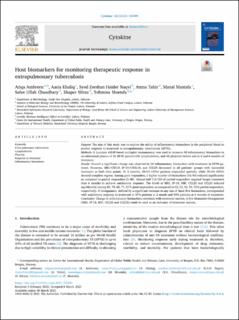Host biomarkers for monitoring therapeutic response in extrapulmonary tuberculosis
Ambreen, Atiqa; khaliq, Aasia; Naqvi, Syed Zeeshan Haider; Tahir, Amna; Mustafa, Manal; Chaudhary, Safee Ullah; Mirza, Shaper; Mustafa, Tehmina
Journal article, Peer reviewed
Published version

Åpne
Permanent lenke
https://hdl.handle.net/11250/2767804Utgivelsesdato
2021Metadata
Vis full innførselSamlinger
Sammendrag
Purpose
The aim of this study was to explore the utility of inflammatory biomarkers in the peripheral blood to predict response to treatment in extrapulmonary tuberculosis (EPTB).
Methods
A Luminex xMAP-based multiplex immunoassay was used to measure 40 inflammatory biomarkers in un-stimulated plasma of 91 EPTB patients (48 lymphadenitis, and 43 pleuritis) before and at 2 and 6 months of treatment.
Results
Overall a significant change was observed in 28 inflammatory biomarkers with treatment in EPTB patients. However, MIG/CXCL9, IP-10/CXCL10, and CCL23 decreased in all patients' groups with successful treatment at both time points. At 2 months, 29/64 (45%) patients responded partially while 35/64 (55%) showed complete regress. Among good responders, a higher number of biomarkers (16/40) reduced significantly as compared to partial responders (1/40). Almost half (14/29) of partial responders required longer treatment than 6 months to achieve satisfactory response. The levels of MIG, IP-10, MIF, CCL22 and CCL23 reduced significantly among 80, 74, 60, 71, 51% good responders, as compared to 52, 52, 52, 59, 52% partial responders, respectively. A biosignature, defined by a significant decrease in any one of these five biomarkers, corresponded with satisfactory response to treatment in 97% patients at 2 month and 99% patients at 6 months of treatment.
Conclusion
Change in inflammatory biomarkers correlates with treatment success. A five biomarker biosignature (MIG, IP-10, MIF, CCL22 and CCL23) could be used as an indicator of treatment success.
